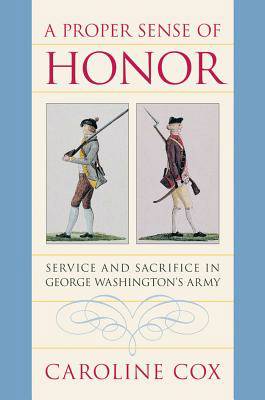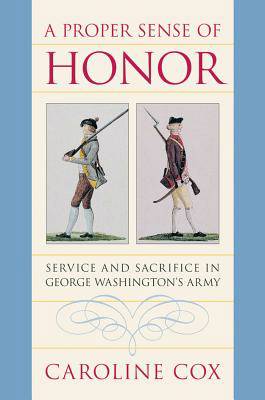
- Afhalen na 1 uur in een winkel met voorraad
- Gratis thuislevering in België vanaf € 30
- Ruim aanbod met 7 miljoen producten
- Afhalen na 1 uur in een winkel met voorraad
- Gratis thuislevering in België vanaf € 30
- Ruim aanbod met 7 miljoen producten
Zoeken
A Proper Sense of Honor
Service and Sacrifice in George Washington's Army
Caroline Cox
Paperback | Engels
€ 50,45
+ 100 punten
Omschrijving
Starting with the decision by patriot leaders to create a corps of officers who were gentlemen and a body of soldiers who were not, Caroline Cox examines the great gap that existed in the conditions of service of soldiers and officers in the Continental army. She looks particularly at disparities between soldiers' and officers' living conditions, punishments, medical care, burial, and treatment as prisoners of war. Using pension records, memoirs, and contemporary correspondence, Cox illuminates not only the persistence of hierarchy in Revolutionary America but also the ways in which soldiers contested their low status.
Intriguingly, Cox notes that even as the army reinforced the lines of social hierarchy in many ways, it also united soldiers and officers by promoting similar conceptions of personal honor and the meaning of rank. In fact, she argues, the army fostered social mobility by encouraging ambitious men to separate themselves from the lowest levels of society and giving them the means to enact that separation. At a time when existing social arrangements were increasingly challenged by war and by political rhetoric that embraced the equal rights of men, Cox shows that change crept slowly into American military life.
Intriguingly, Cox notes that even as the army reinforced the lines of social hierarchy in many ways, it also united soldiers and officers by promoting similar conceptions of personal honor and the meaning of rank. In fact, she argues, the army fostered social mobility by encouraging ambitious men to separate themselves from the lowest levels of society and giving them the means to enact that separation. At a time when existing social arrangements were increasingly challenged by war and by political rhetoric that embraced the equal rights of men, Cox shows that change crept slowly into American military life.
Specificaties
Betrokkenen
- Auteur(s):
- Uitgeverij:
Inhoud
- Aantal bladzijden:
- 368
- Taal:
- Engels
Eigenschappen
- Productcode (EAN):
- 9780807858615
- Verschijningsdatum:
- 27/08/2007
- Uitvoering:
- Paperback
- Formaat:
- Trade paperback (VS)
- Afmetingen:
- 157 mm x 234 mm
- Gewicht:
- 526 g

Alleen bij Standaard Boekhandel
+ 100 punten op je klantenkaart van Standaard Boekhandel
Beoordelingen
We publiceren alleen reviews die voldoen aan de voorwaarden voor reviews. Bekijk onze voorwaarden voor reviews.







